The Cube Microplex FAQ
Last changed $Date: 2001/03/31 19:28:32 $, making this $Revision: 3.2 $.
NOTE: Parts of this FAQ may be out of date. Please
send us
any suggestions or corrections.
The most frequently asked question is always "Where can I get money ?"
Please see sections 2.1 through 2.7
for answers.
If you read no other part of this FAQ, read section 4.8.
NONPROPRIETY EXISTENCE
1.1) Do you talk about collaboration, ownership, digital and economy at the Cube ?
1.2) Is the Cube Microplex like other cinemas ?
1.3) For example ?
SELF ECONOMY
2.1) How can I change the world ?
2.2) How would I recognise a cultural organisation ?
2.3) What's the economy of the Cube ?
2.4) What about the money ?
2.5) How much ?
2.6) Where can I get a free computer ?
2.7) Is money any good ?
OPENSPACE
3.1) How can I stay in shape with Linux ? Can I do Linux outdoors ?
3.2) Can I see this done ?
3.3) Can I play too ? What about special clothes ?
3.4) What does this picture mean ?
3.5) I'm interested in extreme computing - what's the ultimate with Linux ?
TECHNO-SALVATION
4.1) Can I check my Hotmail ?
4.2) Does all open source software look this good ?
4.3) How else can I subvert my environment ?
4.4) I'm a Luddite/Secretary - can Linux help ?
4.5) What else is interesting ?
4.6) Isn't this political ?
4.7) Is it safe ?
4.8) How can I control it ?
4.9) I have a problem with my computer. [state error]
Where can I get support ?
4.10) Should I put Linux on my Macintosh ?
4.11) Is there a quick way to be hardcore ?
FIGHT CLUB
5.1) Is there a cultural prototype for Linux ?
5.2) Tell me more -
5.3) What next ?
5.4) How do I make a petrol bomb ?
5.5) How do I make a Molotov Cocktail ?
5.6) What happened to DIY ?
5.7) When do you feel powerful ?
5.8) What about direct action ?
HARDWARE ENVIRONMENTALISM
6.1) Is Skip to Server DIT ?
6.2) Do I look cool ?
6.3) What about the environment ?
6.4) So to what degree should I conserve ?
6.5) What do you think about ?
6.6) Would you call yourself an evangelistic cowboy ?
6.7) ?
6.8) Won't everyone want Linux ?
NONPROPRIETY EXISTENCE
1.1) Do you talk about collaboration, ownership, digital and economy at the Cube ?
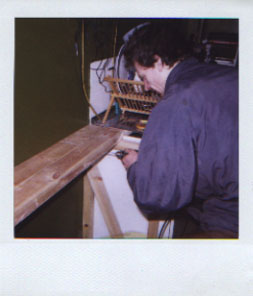
heath: We discuss a lot of these issues every day. And girls and direct action - the things we talk
about when we're drilling holes in walls. Especially concerning methods of
working. We disagree on everything, one minute hogge will say - we should just
go out & buy it, and I say - no, we should make it out of matchsticks. Then
when I get frustrated and lazy he turns around and becomes hardcore.
hogge: The Cube is more a research
institute - we're researching how to work. Everything we do is research.
heath: And end use.
1.2) Is the Cube like other cinemas ?
hogge: The Cube is an application in a social context. It's an artist-run
cinema where the project is the running of it by artists.
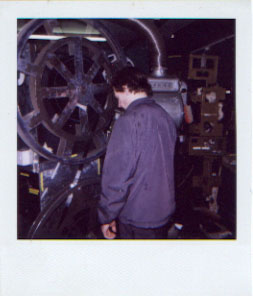
hogge: We've invaded form - we're transforming the social activity of cinema
and transferring it into other applications. It's still a cinema but we're
trying to run other things, experiment in other ways with the overall shape.
Although we're still limited to what people will perceive as an event. And pay
money to come to.

1.3) For example ?
SKIP 2 SERVER
£3. Why not build your own? A practical workshop at the Cube,
Bristol on how to build a fully functional internet server from
salvaged and scrap components using open source software such as Linux. Follow
no-leader. From skip raid and telephone scrounge to handi-work and
auto-construction satisfaction.
Free entrance if you bring tools: screw drivers/pliers/soldering iron and any
computer components: cdrom drive/network card/motherboards/ram/hard
drives/powersupplies cases/floppy drives/keyboards/mice/monitors/cables.
As well as yourself participants include:
- redundant technology initiative - http://www.lowtech.org
- irational.org -
http://irational.org
- Southspace - http://www.southspace.org
- Linux community
experts - http://www.debian.org
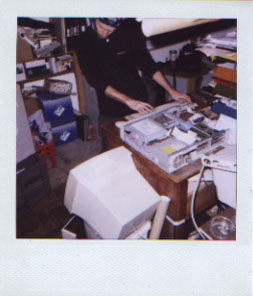
SELF ECONOMY
2.1) How can I change the world ?
hogge: There should be artist-run pubs, hospitals, banks - a cinema's an easier
one though in some ways. You know - hey, cinema.
All those social and cultural forms to play with.
heath: We don't do enough.
hogge: We could be intervening every night. During the films and events.
heath: It would be as absurd to have an artist-run hospital as it is to have an
administrator-run arts centre.
2.2) How would I recognise a cultural organisation?
hogge: A cultural institution is usually a kind of transparent host, it
provides culture to the masses. But the workforce, the organisation itself, will
not be a factor in this overtly. We invert the whole thing and say - OK, let's
not worry about the event: the organisation is the project. Let's name
all the individuals, go through all their motivations - turn it inside out.
It's much more interesting, the guts of it. We're not putting the cultural form
before the organisation - to me the organisation is the content.
heath: We should shut the cinema down.
hogge: It's true.
COLLABORATIVE UNEMPLOYMENT
2.3) What's the economy of the Cube ?
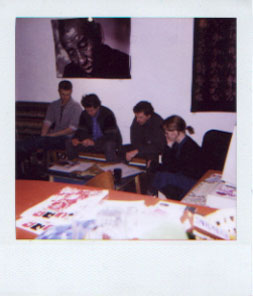
heath: Everyone's a volunteer.
hogge: There's a lot of seduction involved.
hogge: If we had money to pay people, those people wouldn't be very dedicated,
I think. We would be less dedicated. We wouldn't have chosen to do it, we would
have chosen to receive money. This is what most people persevere with, tolerate
- a job, and the aim is to get money. The struggle is what to do with the
money. What to spend it on, where to go on a holiday and which clubs to go to,
in what clothes.
2.4) What about the money ?
hogge: We face issues of funding. People come into the office and say - we'll
put you on the map - urban development funds, we're talking millions and
millions of pounds - and by the way you might have to change your management
structure.
2.5) How much ?
heath: There's this Active
Community Unit who want to give us hundreds of thousands of pounds - that's
the Home Office - they want to relocate us upstairs, give us loads of fast
connections. You've got to apply but we fulfill all the criteria. Except that
we're hardcore punk DIY activists.
hogge: I say you make that part of the application.
heath: But then we wouldn't get it.
hogge: Exactly. You're showing the limits of their project. You're saying -
although we fulfill all these things, there's some other factors that will
make you decide against what we're doing.
heath: Like if we said we're taking computers out of skips and putting Linux
on them. Instead of buying them from Home Office partner organisations like
Microsoft.
2.6) Where can I get a free computer ?
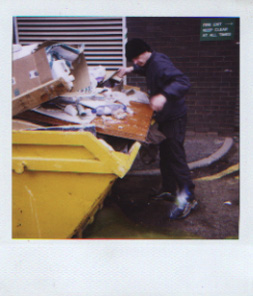
hogge: There was a skip with a fence around it, security cameras on the fence.
This was proper rubbish: mixture of tree branches and then office stuff.
I jumped over, grabbed a few things - filing drawers, a computer - passed it
over the fence and jumped back over. We got about 10 yards and then this
guy came out - a bodybuilder security guy type with his head on a mobile phone
saying OI. PUT THAT BACK - we said why, and he said that's OUR RUBBISH.
heath: He said - YOU'VE JUST RAIDED PRIVATE PROPERTY. Which is correct.
hogge: He wanted to reinforce that kind of authority.
heath: He made us throw it back over the fence. Which destroyed the computer,
smashed it into a million pieces. I quite enjoyed that actually,
to see the desired object destroyed before us. That could make a good TV
game show.
hogge: We will keep retrieving things that way. I always territorialise rubbish.
heath: Even to the point of going on to private property and basically
stealing it.
hogge: Well I'm prepared to confront someone and say - oh come on, you know -
it's rubbish.
2.7) Is money any good ?
heath: We had a discussion the other day about ownership. Receiving these kind
of funds
from the government, you don't actually learn anything except how to
write grants and spend money. If you go to a shop and buy a load of
computers, you don't really end up owning them - you don't necessarily know how
to run them or even what to do with them. Hogge just bought a mixer and he's
just going to sell it again. Didn't feel any emotional attachment to it, just
wants to get the money back. Whereas if he'd built it or found it or even
stolen it he'd feel more ownership towards it, because the money is really the
opposite of ownership. We now know how to assemble computers and how to fix
them and more importantly how to use them.
OPENSPACE
heath: Going for a walk could be quite relevent to the discussion.
3.1) How can I stay in shape with Linux ? Can I do Linux outdoors ?
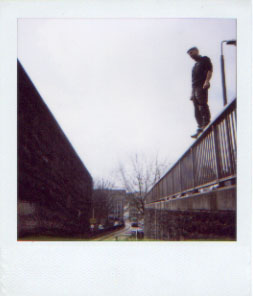
heath: It's all about deconditioning really. Every day you condition yourself -
you learn techniques for fitness, or just for walking down the street. And by
doing that you become inflexible, both physically and in the way you think you
can behave. I like the idea that we are going out to untrain, unskill
ourselves. For example yesterday I went out for a walk with his 5-year old kid.
It was an opportunity for us both to develop. I was doing things that would
push my limits with walking, I was walking up some railings. I tried for 6
hours once just to do things in an unconditioned way, like walking sideways, it
was exhausting.
3.2) Can I see this done ? Where?
heath: There's a new Luc Besson film out about people who are in urban
environments, really pushing themselves physically and escaping alienation.
It's called Yamakasi
Not everything's potentially possible that's depicted in this film.
3.3) Can I play too ? What about special clothes ?
heath: It's not like you're going jogging - it takes a lot of nerve. Most
people - adults - aren't prepared to play, even on the institutionalised kit
like the swings. Let alone jumping off the kerb, backwards.
hogge: That's because they're not serious enough.
3.4) What does this picture mean ?
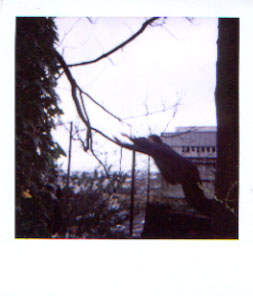
heath: With the Linux thing - it is important to have a discussion around play
because it seems to me Linux is a recreational thing. The people that actually
wrote this stuff, they weren't
paid to do it, they did it in their spare time. There were political
motivations but I think probably it was mostly, hey cool. Wouldn't it be cool
to have Unix running on my
Amiga.
hogge: With Linux - as you get into it and learn things,
obviously you do become conditioned and regimented.
We should be getting it to do things that would be counterproductive.
Or absurd.
3.5) I'm interested in extreme computing - what's the ultimate with Linux ?
heath: What we should be doing really is erasing Linux from our computers
and finding an underground OS, you know, hardcore. There are other
operating systems out there.
TECHNO-SALVATION
4.1) Can I check my Hotmail ?
hogge: We're collecting hardware we find on the street and building machines
with Linux, to offer to people so they can use them - so then what actually
happens -
heath: They check their hotmail.
hogge: People use it a lot for that, communication. To me it's like, what else
can they use this for, to intervene in their lives.
4.2) Does all open source software look this good ?
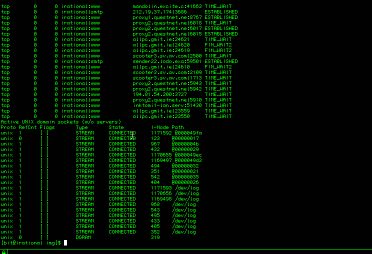
heath: The reason we have a computer in the foyer with Linux on it is a piece
of environmental propaganda. If you imagine walking into the ICA foyer and
they had Linux - that would change the atmosphere a bit. Confuse all those
cool Mac designers.
4.3) How else can I subvert my environment ?
heath: We're thinking of filtering out all hotmail coming into the Cube. All
dotcom addresses might be worth doing too - but then again it's not a
proven tactic, shutting things down. It's better to open up possibilities.
4.4) I'm a Luddite/Secretary - can Linux help ?
hogge: Leslie is doing admin at the Cube. We took her old machine and gave her
Linux. She doesn't care what the equipment is, she just wants to send things -
if we gave her a fax machine she'd be faxing.
heath: I like the idea that Leslie will go somewhere other than the Cube,
she'll leave eventually and go and work at the Lux or somewhere corporate and
they'll have a Microsoft Windows machine and she will not know
how to use it. She'll say - what is this operating system, I use Linux! - and
she won't be like some techie nutter, she'll just be an average office
administrator.
4.5) What else is interesting ?
hogge: Linux is interesting not because it's free -
heath: No, it's because it's written by a community. You can pirate anything
these days - and in some ways this type of environment can be seen as more
subversive.
4.6) Isn't this political ?
hogge: For me computers are quite political. What you open yourself up to when
you've got them. And spreading an open source aesthetic is good, for the
sake of it. A friend of mine wants to spend loads of money and get a new
PC. I'm saying to him look - put Linux on it and learn about computing. Up
to now all the activities he's been doing on his computer have been
dictated by operating systems and programmes, so if he makes a change he'll
have to rethink everything. He'll change his whole way of doing things,
he'll change his perceptions - just from changing the OS.
That process in itself is exciting, I want him to go through that process
for the sake of it.
4.7) Is it safe ?
heath: When I first put Linux on my laptop, I thought why the hell am I doing
this? - I've got this nice Mac machine that I know how to use, gets things
done really quick - I've spent £1500 on this laptop and now I don't even
know how to find a file. I know this is a really good thing to do but - it
was a challenge to myself. I know how to find files now. From another
country.
hogge: It's quite liberating to separate the computer from the operating system.
4.8) How can I control it ?
hogge: It takes a lot to accept that you're in a whole different realm of
activity and you might lose control. Become something else entirely.
4.9) I have a problem with my computer. [state error] Where can I get support ?
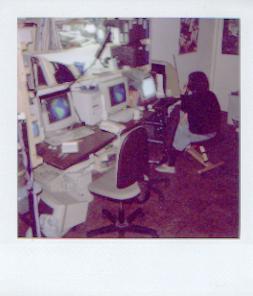
heath: This is an issue we address here a lot of the time - how far do you
support people. I've got a policy of not answering more than 3 technical questions
from each person per day. There are other people like Thomax Kaulman in Berlin,
who wrote Orang. He won't answer any
questions - maybe one a month - even from me and I've been doing computers 22
years. He'll say nothing. Try it I know
why he does that, I had a question with a video encoder we were building and I
was cursing him, all he had to do was log into the computer remotely and type a
few commands to make it work. And instead he forced me to spend a month of hell
on that computer. I had to learn how to compile kernels, it really stretched
me. But I'm glad he did it. In some ways.
4.10) Should I put Linux on my Macintosh ?
heath: The thing about Linux is, you can do something on your Mac that is very
martial art. You do have to be disciplined to learn it - its about
conforming and in the end you understand it. It's an act of faith.
4.11) Is there a quick way to be hardcore ?
hogge: The best way to learn about Linux it is to download programmes, even if
you don't know what they do. And then run them.
FIGHT CLUB
5.1) Is there a cultural prototype for Linux? How about - Fight Club ?
heath: cool -
5.2)
Tell me more. I'm interested in doing something intensely in parallel economy.
Wiping out my office, the cosy desktop environment, for the ruggedised
commandline outdoors. The squaddiness - Root having this power, one guy.
Passwords and permissions and always being on the edge of catastrophe .
hogge: Yeah - Linux is fight club and Microsoft would be Ikea -
heath: No - Macintosh is Ikea; Argos is more Microsoft.
hogge: In fight club he blew up his flat, it was full of the Ikea catalogue.
Yin-yang tables.
5.3) What next?
heath: Maybe we should attack Ikea Bristol ?
hogge: We should petrol bomb Ikea as a matter of fact.
5.4) How do I make a petrol bomb ?
hogge: We should do workshops - just a milkbottle and a very small amount of
petrol, there's not much in them -
5.5) How do I make a Molotov Cocktail ?
heath: You have to use some vaseline.
5.6) What happened to DIY?
heath: The word DIY has been taken over by those hardware stores -
hogge: Ikea is like self-construct. I've got a bit of Ikea at home, a cd shelf,
I constructed it by myself.
heath: That's an illusion.
5.7) When do you feel powerful ?
heath: I feel powerful when I'm root.
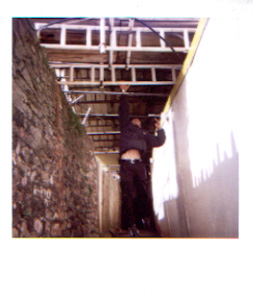
5.8) What about direct action ?
heath: Direct action tends to be a fairly social activity;
terrorism is more elitist and individualistic.
heath: If you do things badly by yourself is that elitist ?
heath: We should be DIT - do it together.
HARDWARE ENVIRONMENTALISM
6.1) Is Skip to Server DIT ?
heath: Skip to Server would be the best example - it encapsulates all the
things we've been talking about. It was hosted by the Cube and it was done in
the way of the Cube - there was no demonstration, no welcome, no lessons -
people came along with their equipment and got on with it. We just had the idea
and emailed it out. And made sure a few key people were there, local
enthusiasts.
hogge: I did start things off by saying - here's a computer, let's work on it - and
then someone said - I've got a copy of
trinux here, on a floppy - and I had nothing more to do with it.
Literally just handed over the event.
6.2) Do I look cool ?
heath: Most of the people who came said they really liked the way we did it.
There were probably three different groups of people there. Artists - who
are now in the modernist sense probing into their medium quite thoroughly;
then a good section of activists who I recognised; and then there
were the professional or thorough computer builders, people from very large
companies who programme all day. The sort of people who actually made Linux
- because they have the expertise and the facilities. The reason these
things work is if you get a good mix of people. You shortcircuit people's
defences. Or expectations. The artist is thinking - shit, I can get free
information and get famous; the other people are thinking - hey, I might be able to show off and make
some friends. There's an exchange, there's an economy of people being
together. So I think that event was successful.
heath: We'll probably do another one, and it will be routers. Rubbish to router
or garbage to gateway - we haven't got the name down yet.
6.3) What about the environment ?
heath: It's environmentalism isn't it. Techno-environmentalism. Conservation.
6.4) So to what degree should I conserve ?
heath: You should be retrieving things that you don't need. It's like in fight
club - you just have to become more sophisticated to live in a derelict
building than at home with a washing machine. That's what I like about Linux -
you take a machine that was totally useless with Windows 95 -
too slow to do anything - and you put Linux on it and it's a fast machine
again.
hogge: It doesn't quite work like that - you can't just put it on an old
machine and it becomes fast -
heath: Well you also have to change how you use it, so you don't do video
editing. But it can be something else, a
router for example. We want to build one and it won't even need a hard drive.
Just boot off a floppy.
6.5) What do you think about ?
hogge: You can justify any kind of activity - once you've relinquished the need
to earn money and get caught up in a career. Then you can just spend your
time doing anything really.
heath: I think a bit about classic environmental issues - like if we're making
a garden for the Cube it would be good to grow food in it - but I don't feel
it's that radical. The thing with recycling, taking things out of bins, is that
we're not putting anything back into that economy; we're transferring wealth
into our own circles. Not paying for things subverts that thing about choice.
This is definitely an environmental angle for me.
6.6) Would you call yourself an evangelistic cowboy ?
heath: I quite like the Bananarama / FunBoy Three song -
It Ain't What You Do It's
The Way That You Do It. I only got the meaning of that one a few years ago.
6.7) ?
If you want a computer and you go to the shops, there's hundreds of choices.
But with food - if someone's cooked you a meal, there's only one choice and
it's the best meal ever. Finding something by chance is also very pleasurable.
The fact that you're not plagued with that choice.
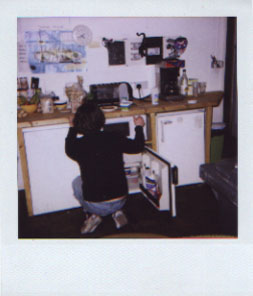
6.8) Won't everyone want Linux ?
hogge: Think of the permutations on the command line that you've got.
But that's not what people will want to do.
heath: They want to see buttons, chrome finish.
hogge: People don't want that flexibility, they want to be conditioned.
They want to know that you press that button and this is what happens.
heath: I think choice is the wrong word though. Choice is when you're walking
down the street, you come to a Y junction and you have two choices. What we're
saying is you just don't have a street.
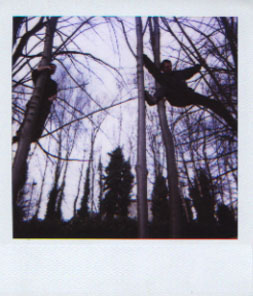
This document is Copyright 2001 by Hogge, Heath and Kate.
Permission is granted for it to be reproduced
electronically on any system connected to the various networks which make up
the Internet, USENET, and FidoNet so long as it is reproduced in its entirety,
unedited, and with this copyright notice intact.












